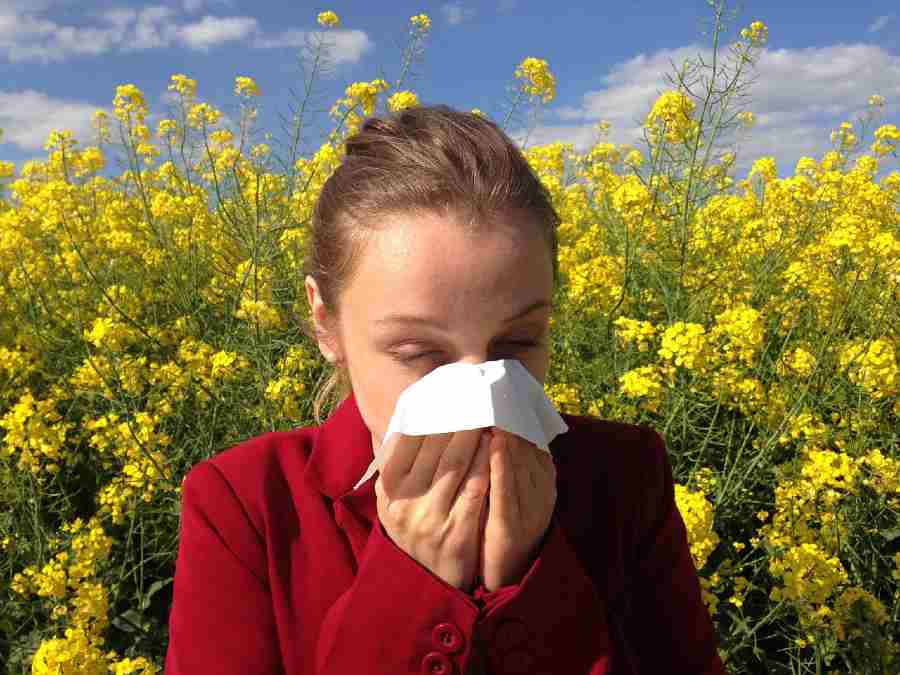An allergy is an abnormal immune response reaction that occurs when the body is exposed to certain foreign substances. Its an exaggerated reaction because the immune system is supposed to see these substances as harmless. Below is an overview of different types of allergies, their causes, tests, and treatment options.
Types of Allergy

There are several types of allergies caused by different allergens. The most common ones include:
1. Food Allergy
This over-reaction by the body’s natural defenses occurs after exposure to certain food varieties. Although this allergic reaction is usually mild, it can progress and become severe. The overreaction tends to affect various processes in the body, especially the digestive process.
Causes
Food allergy conditions can be genetically inherited. It’s usual to find that children suffering from it most likely inherited it from parents and or their siblings suffer from the same condition. Common foods that cause allergic reactions include protein-rich varieties like:
- Fish
- Milk
- Eggs
- Soy
- Shellfish
- Peanuts, etc.
Symptoms
- Shortness of breath
- Itchy skin or hives
- Difficulty in swallowing food
- A tingling sensation in the mouth
- Diarrhea
- Nausea and vomiting
Food Allergy Testing and Treatment
Food allergy test may involve blood or skin tests. If the reaction is minor, the doctor will recommend OTC medications or prescription antihistamines. In case of a severe reaction, then an emergency epinephrine injection may be administered for food allergy treatment.
2. Drug Allergies
They occur after taking certain medications. Note that any type of drug, prescription, OTC, or herbal medication can induce an allergic reaction. But it commonly occurs when patients take certain specific medications.
Causes:
Common drugs that can cause allergies include:
- Sulfa drugs
- Aspirin
- Antibiotics such as penicillin, amoxicillin, and ampicillin among others.
- NSAIDs such as naproxen and ibuprofen
- Drugs for chemotherapy
Common symptoms include:
- A runny nose
- Skin rash and hives
- Wheezing
- Shortness of breath
- Swelling
- Itching
Drug Allergy Test and Treatment
Doctors normally do skin tests. Alternatively, blood tests may be recommended depending on the severity of the condition. The first treatment plan is normally the withdrawal of the allergy-causing drug. Thereafter, the doctor may prescribe antihistamines, an epinephrine injection, or administration of corticosteroids.
3. Pollen Allergy

It’s also known as hay fever or seasonal allergic rhinitis. This condition sometimes triggers the development of asthma symptoms. It is caused by pollens-tiny grains that plants release for the fertilization process.
Causes
- Grasses like Bermuda, sweet vernal, and rye
- Weeds like ragweed, sagebrush, and English plantain
- Trees such as cottonwood, oak, beech, and sycamore.
Symptoms
- Watery or itchy eyes
- Nasal congestion
- Sneezing
- Wheezing
- Itchy throat
Pollen Allergy Test and Treatment
An allergist will do skin prick tests to determine the cause. Treatment options include OTC drugs such as:
- Antihistamines – Benadryl and zyrtec
- Decongestants – Afrin nasal spray and Sudafed
- A combination of decongestant and antihistamine- Claritin-D and Actifed
Note: it’s also recommended that you avoid the triggers. This involves staying indoors during windy days or when the pollen count is extremely high. Besides that, you can always wear a dust mask when going outdoors.
4. Pet Allergy
It’s an allergic reaction that occurs due to exposure to proteins found in the saliva, urine, or skin flake cells of animals. It may simply cause an allergic reaction or trigger the symptoms of asthma in some individuals.
Causes
Pet allergies are caused by animals such as:
- Cats
- Dogs
- Rabbits
- Rodents
Symptoms
Skin symptoms such as itchy skin, eczema, and hives
- Difficulty in breathing
- A runny nose and sneezing
- Itchy throat or nose
- Nasal congestion
Pet Allergy Test & Treatment
The allergist may do skin or blood tests to determine the exact cause of the condition. Treatment options involve staying away from the animal that causes allergy. Besides that, the allergist may prescribe medications such as:
- Decongestants
- Corticosteroids
- Antihistamines and
- Leukotriene modifiers
5. Latex Allergy
It’s an overreaction to certain proteins found in natural rubber latex. The body mistakenly identifies latex as a foreign substance once your skin comes into contact with it, leading to an extreme reaction.
Causes
- Direct contact with latex products such as gloves, balloons, and condoms.
- Inhaling the particles released by latex products
Symptoms
- Skin redness, itching, and hives
- Runny nose and sneezing
- Itchy and watery eyes
- Coughing
- Wheezing and difficulty in breathing
Latex Allergy Tests and Treatment
The allergist will most likely carry out a skin allergy test to determine the main cause. There is no cure for latex allergy and allergists normally administer drugs that simply reduce the symptoms. First, you need to avoid coming into contact with latex.
Secondly, the doctor may prescribe injectable epinephrine, corticosteroids, or an antihistamine.
6. Eye Allergy
It’s also known as allergic conjunctivitis. The common condition occurs when an allergen irritates the eyes. When this overreaction occurs, the eyes end up releasing histamine, a substance that’s designed by the body to help fight the allergen.
Causes of Eye Allergy
It’s normally caused by airborne allergens like:
- Pet pander
- Pollen
- Mold
- Smoke and dust
Symptoms
Common symptoms of eye allergy include:
- Increased sensitivity to light
- Teary or runny eyes
- A burning sensation or itchiness
- Red and irritated eyes
- Swollen eyelids
Eye Allergy Test and Treatment
Allergists normally conduct a comprehensive eye examination using a microscope. Besides that, a blood allergy test may be carried out to analyze the type of white blood cells found in your eyes and surrounding areas.
Treatment involves avoiding triggers. Stay indoors to avoid high pollen counts or wear sunglasses when you are going out. Keep your windows closed and always use an air conditioner in your home or when using your car.
The allergist can prescribe OTC drops including tear substitutes to artificially wash away the allergens from the eyes. Besides, decongestant eye drops and oral antihistamines are good. Other prescription medications include non-sedating oral antihistamines, NSAID eyedrops, and immunotherapy.
Allergy FAQs
Do you have a few questions about allergies that need answers? Well, here are some of the commonly asked questions and appropriate answers.
Q. What Are Drugs Used To Treat Allergic Reactions Called?
A. They are called antihistamines. This class of drugs helps to significantly reduce the symptoms of allergy.
Q. How to Allergists Diagnose Allergies?
A. Allergists normally do skin tests or blood allergy test in Singapore to determine the cause of the immune overreaction.
Q. What’s the Difference between Allergies and Common Cold?
A. These two conditions often display the same symptoms and that’s why it can be confusing. But you can tell the difference. Allergic reactions have patterns and aren’t contagious while a cold has no pattern and it’s contagious.
Q. Do Allergies Have Cure?
A. There is no cure for allergies. You can only manage and treat the symptoms to reduce the severity of the reaction.
The Bottom Line
Allergies are found in many forms depending on the triggers and where they affect the body. While others are seasonal, there are allergies that occur throughout the year. Some are even permanent and, therefore, need lifelong management.
The best way to deal with allergies is by learning the appropriate management techniques. Most allergies have no cure hence allergists simply prescribe medications to reduce the severity of the symptoms. So if you can, protect yourself from the triggers. To learn the best way to protect yourself from allergies, visit Ear and Allergy Clinic today.…